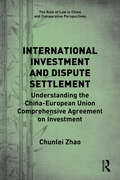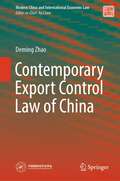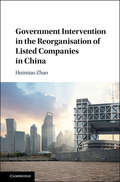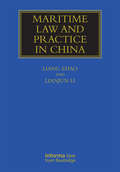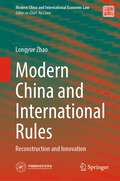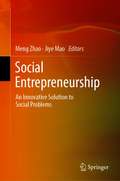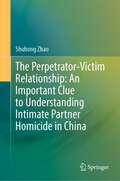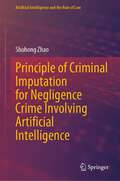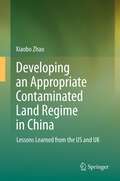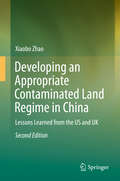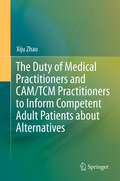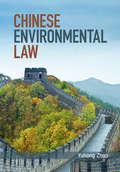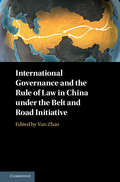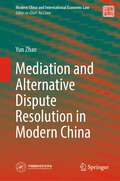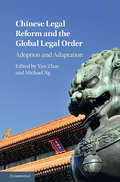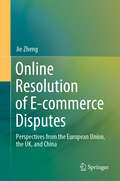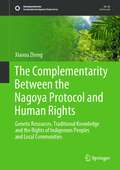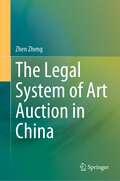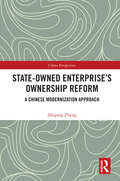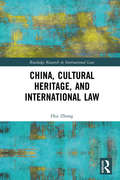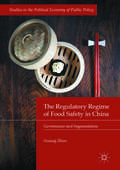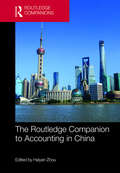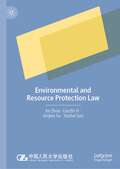- Table View
- List View
International Investment and Dispute Settlement: Understanding the China–European Union Comprehensive Agreement on Investment (The Rule of Law in China and Comparative Perspectives)
by Chunlei ZhaoThis book analyzes the dispute settlement mechanisms under the EU-China Comprehensive Agreement on Investment (CAI), including the already established mechanisms for general state-to-state dispute settlement and the Mechanism to Address Differences for investment and sustainable development issues. When China and the EU, two of the biggest players in international investment, announced the completion of the China-European Union CAI negotiations, the dispute settlement system remained incomplete. While they reached an agreement on state-to-state dispute settlement, the controversial investor-state dispute settlement is subject to ongoing negotiations. This book explores the possible procedural design of investor-state dispute settlement mechanisms under the EU-China CAI, including potential proposals, issues, and solutions. In addition, this work analyzes the separation, connection, and combination of state-to-state and investor-state dispute settlement, all with a mind to ensuring the function and operation of diverse mechanisms and establishing a comprehensive system for successful investment dispute settlement. Focusing on the complete dispute settlement system under the EU-China CAI, this book will be a valuable resource for students, academics, and policymakers working in the areas of international dispute resolution, international investment law, international economic law, and comparative law.
Contemporary Export Control Law of China (Modern China and International Economic Law)
by Deming ZhaoThis book gives practical and in-depth presentation and analysis of the issues under China export control law and economic sanctions regime. This book not only addresses issues faced by the legal entities in China, but also attends to the concerns about Chinese extra-territorial jurisdiction of China export control law and sanctions legislations, on the part of foreign companies. Finally, the author shares his experiences on how to structure export control and sanctions compliance under Chinese law on the part of both Chinese and foreign companies.
Government Intervention in the Reorganisation of Listed Companies in China
by Huimiao ZhaoAs a comprehensive empirical study on the bankruptcy re-organisations of listed companies in China, this book examines the re-organisation of fifty-three listed companies entering bankruptcy between 2007 and 2018. It features raw data from thousands of public announcements of listed companies, helping to present a precise panorama of bankruptcy law in China. The author discusses the nature, extent and appropriateness of government intervention in bankruptcies of listed companies. It also examines the effects of bankruptcy institutions established by the bankruptcy laws to constrain government intervention. The findings suggest that such laws have been inadequate to prevent government intervention. In fact, the biggest obstacle to the smooth implementation of China's reorganisation system is government intervention, one distinct characteristic of the socialist market economy. The book will have broader relevance in terms of informing the debate concerning the government's continuing intervention in economic activity in China.
Maritime Law and Practice in China (Maritime and Transport Law Library)
by Liang Zhao Li LianjunA comprehensive treatment of Chinese maritime law and judicial practice, this book covers both substantive law and procedure law of maritime law in mainland China. This is a professional book for both academics and practitioners in the field of maritime law. Including analysis of and comment on judicial practice from the Supreme People’s Court, Higher People’s Courts and ten maritime courts, as well as a whitepaper of Chinese maritime adjudication for 30 years (1984-2014), this brings to an English-speaking audience for the first time some of the most technical aspects of maritime law. It is therefore an invaluable resource for all those interested in maritime law in China.
Modern China and International Rules: Reconstruction and Innovation (Modern China and International Economic Law)
by Longyue ZhaoThis book is the final study report of the key project of the National Social Science Foundation of China, “China and the Reconstruction and Innovation of International Rules in the New Era of Global Value Chain”. On the basis of a comprehensive analysis of the complex situation of international rule reconstruction and innovation in the new era of the global value chain, this book makes an in-depth and systematic analysis on six types of international rules, namely official export credit rules, international competition rules, cross-border e-commerce and digital trade rules, ISDS, multilateral agreement on investment and international regulatory cooperation. It also introduces the theories and practices of China's engagement in the new round of reconstruction and innovation of international rules.
Social Entrepreneurship: An Innovative Solution to Social Problems
by Meng Zhao Jiye MaoThis book incorporates theoretical framework and management cases in discussions on social enterprise in China. The authors look to address two fundamental questions about social enterprises in China that have been very controversial over the years. First, what is social enterprise? This book proposes a framework that defines Chinese social enterprises based on social entrepreneurship, and includes ten case studies for justification. Second, who are well-performed social enterprises with financial viability and proved social impact? The book describes in detail some of the leading social enterprises in China. It is aimed at a wide target audience. Practitioners will learn experience and lessons from the case studies. Academics can use the cases in different teaching contexts, and gain research inspirations from our framework and case studies. Policy makers, accreditation agencies, professional service providers, and institutional investors will learn to identify and evaluate promising social enterprises.
The Perpetrator-Victim Relationship: An Important Clue to Understanding Intimate Partner Homicide in China
by Shuhong ZhaoThis book is devoted to illustrating the significance of perpetrator-victim relationship, including its status and state, in understanding intimate partner homicide (IPH) in the context of China today after comparing with the findings in the previous studies. By analyzing the correlation between intimate relationships as a focal variable and other variables such as IPH characteristics and risk factors, a deeper understanding of IPH in China today has emerged. Finally, this book shows that many perpetrators and victims had intimate relationships with people outside their marriages as the main reason for the rapid increase in the number of instances of IPH, which seems to be in tandem with China’s rapid modernization and urbanization. Presenting the sole academic research that closely investigates the characteristics of intimate partner homicide in modern China, the book is a valuable resource for not only for the Chinese government but also for Chinese and international researchers.
Principle of Criminal Imputation for Negligence Crime Involving Artificial Intelligence (Artificial Intelligence and the Rule of Law)
by Shuhong ZhaoThis book provides an in-depth discussion of the theoretical and practical issues of criminal imputation for negligence crime involving artificial intelligence. Accordingly, this study combines the imputation challenges brought about by AI with traditional criminal imputation theory and analyses imputation for negligence crime involving AI from three aspects: the basic principles, structure, and results of imputation for negligence crime involving AI. The traditional theory of imputation is discussed in detail. The readership is a group of people interested in this topic, including, in particular, interested laymen, undergraduate students and postgraduate researchers. The highlights of this book are it identifies the imputation challenges bought about by AI, reveals the theoretical and practical gap in the criminal imputation of negligent crimes involving AI, and provides an in-depth and creative ideas of criminal imputation for the negligent crimes involving AI.
Developing an Appropriate Contaminated Land Regime in China
by Xiaobo ZhaoLike all industrialized countries, China has encountered increasing problems with land contamination in recent years. Abandoned mining and manufacturing sites and obsolete industrial complexes, while also creating new polluting industrial enterprises, represent impending environmental threats. More importantly, a number of social and economic problems have developed and must be dealt with, in some cases urgently. Contaminated land laws and regulations have been established and have evolved in the US and UK and many other jurisdictions over the past few decades. These regimes have substantially influenced the relevant legislation in the context of numerous Asian and European countries and will inevitably benefit similar legislative efforts in China. This book is the first monograph that focuses on how China can learn from the US and UK with respect to contaminated land legislation and comprehensively illustrates how contaminated land law could be created in China. It will be of interest to academics and practitioners in environmental law in China, as well as the US and UK.
Developing an Appropriate Contaminated Land Regime in China: Lessons Learned From The Us And Uk
by Xiaobo ZhaoLike all industrialized countries, China has encountered increasing problems with land contamination in recent years. Abandoned mining and manufacturing sites and obsolete industrial complexes, while also creating new polluting industrial enterprises, represent impending environmental threats. More importantly, a number of social and economic problems have developed and must be dealt with, in some cases urgently. Contaminated land laws and regulations have been established and have evolved in the US and UK and many other jurisdictions over the past few decades. These regimes have substantially influenced the relevant legislation in the context of numerous Asian and European countries and will inevitably benefit similar legislative efforts in China. This book is the first monograph that focuses on how China can learn from the US and UK with respect to contaminated land legislation and comprehensively illustrates how contaminated land law could be created in China. It will be of interest to academics and practitioners in environmental law in China, as well as the US and UK.
The Duty of Medical Practitioners and CAM/TCM Practitioners to Inform Competent Adult Patients about Alternatives
by Xiju ZhaoThe book pays interest to a small and almost untouched topic: a health practitioner' s duty to inform about alternatives. It covers both orthodox medicine practitioners and CAM practitioners. The topic is explored in a co mparative way, examining the laws of not only common law jurisdictions, such as the USA, England, Canada, Australia, New Zealand, but also two East Asia jurisdictions ( China and Japan ) . It uses the collective wisdom of several common law jurisdictions, but also differentiates them. It places the issue of "disclosure of alternatives" in a clear and wider context, making a cogent distinction between diagnosis/treatment and information disclosure.
Chinese Environmental Law
by Yuhong ZhaoSince the economic take-off of the 1980s, China has undertaken industrialization and urbanization at unprecedented scale and speed. As it became the world's second largest economy, the burden of pollution has reached the limits of nature's carrying capacity. Chinese Environmental Law provides a comprehensive, structured and up-to-date analysis of the increasingly sophisticated Chinese environmental law regime. It examines the statutory regulation of pollution in detail, covering key environmental statutes, policies and plans, and investigates judicial innovation in the interpretation and application of environmental legal instruments. The book presents Chinese environmental law in action and in context. By discussing key institutions and processes, readers gain exposure to the operation of Chinese environmental law and the dynamic interactions among different institutions, both state organs and non-governmental organizations. The unique socio-economic and political context presents special challenges to the implementation and enforcement of environmental law in China.
International Governance and the Rule of Law in China under the Belt and Road Initiative
by Yun ZhaoThe edited volume aims at examining China's role in the field of international governance and the rule of law under the Belt and Road Initiative from a holistic manner. It seeks alternative analytical frameworks that not only take into account legal ideologies and legal ideals, but also local demand, socio-political circumstances, to explain and understand China's legal interactions with countries along the Road, so that more useful insights can be produced in predicting and analysing China's as well as other emerging Asian countries' legal future. Authors from Germany, Korea, Singapore, Mainland China, Taiwan and Hong Kong have contributed to this edited volume, which produces academic dialogues and conducts intellectual exchanges in specific sub-themes.
Mediation and Alternative Dispute Resolution in Modern China (Modern China and International Economic Law)
by Yun ZhaoThe book examines the development and application of mediation in China (including Hong Kong). As a popular mechanism for dispute resolution in Chinese history, mediation is believed to be an important process for realizing the official goal of social harmony. Following an overview of the current situation in mainland China and Hong Kong, the book looks into specific legal issues in the application of mediation and the practical use of mediation in specific lines of businesses. The book can serve as an important reference book on the law and practice of mediation in mainland China and Hong Kong for scholars, practitioners, as well as students of mediation and alternative dispute resolution.
Chinese Legal Reform and the Global Legal Order: Adoption and Adaptation
by Yun Zhao Michael NgThis volume critically evaluates the latest legal reform of China, covering major areas such as trade and securities law, online privacy law, criminal law, human rights and international law. It represents a bold departure from the most recent works on Chinese legal reform by engaging the ideas of experts in contemporary Chinese law with the archival scholarship of Chinese legal historians. This unique interdisciplinary feature affords readers a more nuanced view of the complexities and specificities of how China has problematised legal reforms in various historical contexts when building a progressive yet sustainable legal system. This volume appraises the most current reform in Chinese law by considering China's engagement with globalisation, increasingly complicated domestic situation and historical legal transplantation experiences. It will be of huge interest to students, researchers and practitioners interested in Chinese law and policy, China and Asian studies and Chinese legal history.
Online Resolution of E-commerce Disputes: Perspectives from the European Union, the UK, and China
by Jie ZhengThis book discusses how technological innovations have affected the resolution of disputes arising from electronic commerce in the European Union, UK and China. Online dispute resolution (ODR) is a form of alternative dispute resolution in which information technology is used to establish a process that is more effective and conducive to resolving the specific types of dispute for which it was created. This book focuses on out-of-court ODR and the resolution of disputes in the field of electronic commerce. It explores the potential of ODR in this specific e-commerce context and investigates whether the current use of ODR is in line with the principles of access to justice and procedural fairness. Moreover, it examines the major concerns surrounding the development of ODR, e.g. the extent to which electronic ADR agreements are recognized by national courts in cross-border e-commerce transactions, how procedural justice is ensured in ODR proceedings, and whether ODR outcomes can be effectively enforced. To this end, the book assesses the current and potential role of ODR in resolving e-commerce disputes, identifies the legal framework for and legal barriers to the development of ODR, and makes recommendations as to the direction in which practice and the current legal framework should evolve. In closing, the book draws on the latest legislation in the field of e-commerce law and dispute resolution in order to make recommendations for future ODR design, such as the EU Platform-to-Business Regulation on Promoting Fairness and Transparency for Business Users of Online Intermediation Services (2019) and the United Nations Convention on International Settlement Agreements Resulting from Mediation (2018), which provide the legal basis for ODR’s future development.
The Complementarity Between the Nagoya Protocol and Human Rights: Genetic Resources, Traditional Knowledge and the Rights of Indigenous Peoples and Local Communities (Sustainable Development Goals Series)
by Xiaoou ZhengThis book studies the questions of how and to what extent the Nagoya Protocol on Access and Benefit-Sharing (ABS) can be interpreted and implemented in light of international human rights law, with a sharpened focus on Indigenous Peoples and local communities. The complementarity thesis is built upon the understanding that ABS and human rights should not and cannot be isolated from one another in order to achieve their respective objectives. A mutually supportive approach to these two bodies of international law is articulated throughout the chapters, covering a wide range of international treaties and ‘soft’ instruments, as well as the practices of the United Nations, international treaty bodies, courts, other international organizations and sometimes NGOs. Legal researchers, legislators and policymakers, human rights practitioners and indeed anyone interested in the development of a more coherent and integrated system of international ABS framework will find this book helpful, with its succinct coverage of current ABS and human rights laws and practices, their pragmatic implications and possible ways of integration forward.
Household Energy Consumption in China: 2016 Report
by Xinye Zheng Chu WeiThis book is primarily based on data from the third analysis of domestic energy consumption, and it combines the conclusive summarizes from the previous two investigations. The book sets out to extend the spatial dimension of the research to a global one and discusses future development of domestic energy consumption from a global perspective. Additionally, the book seeks to discover general rules and diversity features via comparison, domestic vs. global. Future predictions via observations and summaries of history are provided for the reader in this volume as well. The studies in this volume not only provide a basic and supportive index for academic research, but also provide readers with a concrete sketch for people to understand energy use in their day-to-day lives, and it provides policy makers with fundamental, need-to-know data.
The Legal System of Art Auction in China
by Zhen ZhengThis book is the first book to comprehensively and deeply explain and construct the legal system of Chinese art auctions. Based on agency theory in traditional contract law, this book combs the legal relationship between client, auctioneer, and buyer. Aiming at the most difficult problem of art identification, this book shows the obligations that auctioneers must perform and the common methods for auctioneers to avoid these obligations. The purpose of this book is to ease the current situation in which the interests of buyers and auctioneers are too opposed and speed up the legalization process of art auctions through the construction of the legal system of art auctions in China. Additionally, using the method of policy demonstration, this book discusses how public power should intervene in the process of art auctions.
State-Owned Enterprise's Ownership Reform: A Chinese Modernization Approach (China Perspectives)
by Zhigang ZhengIn reviewing the new round of state-owned enterprise (SOE) reforms characterized by mixed ownership since 2013 in China, this book systematically investigates the theoretical underpinnings, model options and approaches to implementation of SOE mixed-ownership reforms. SOE reforms have functioned as an integral part of China’s transformation to a market-oriented economy. Responding to the changing economic context and negative repercussions of earlier SOE reforms launched in the late 1990s, SOE mixed-ownership reforms encourage the participation of different types of capital and sounder management mechanisms. The author first reviews the impetus behind SOE mixed-ownership reforms and discusses how modern property rights theory and decentralized control theory perform as the theoretical underpinnings of the reforms. Based on cases of many completed SOE mixed-ownership reforms, the book summarizes and assesses the feasible models and implementation details of the reforms. It also examines how the reforms have impacted state-owned assets as well as executives’ compensation and incentives, both of which run parallel to the core reforms surrounding ownership. The book will appeal to professional readers studying entrepreneurial theory, corporate governance, China’s SOE reforms and Chinese business and the economy, as well as investors and policy makers interested in the Chinese market and Chinese enterprise reform.
China, Cultural Heritage, and International Law (Routledge Research in International Law)
by Hui ZhongChina is a country that is rich in antiquities, but it is also a victim of looting that occurred during the period from the First Opium War to the end of the Japanese Occupation (1840–1945) when innumerable cultural objects were lost overseas. The Chinese Government insists on asserting its interest over its wrongfully removed cultural heritage and has sought for the return of lost cultural heritage by all means in accordance with relevant international conventions and Chinese laws. However, securing the return has been, and continues to be, problematic. Little research has been done regarding the question as to whether China has a legal basis for recovery, which is the first legal hurdle that China needs to get over. In addition, China does not have a legal basis for all cultural heritage taken during the period of 1840–1945. Claims for return without a legal basis are usually silenced or, at best, discussed only but very rarely facilitated. This book provides an answer for the return of Chinese cultural heritage. It examines the law contemporaneous to the removal of Chinese cultural heritage and its application. For this lack of a legal basis, this book argues that a new customary international law is emerging, according to which the interests of the states of origin in their wrongfully removed heritage should be prioritised. This proposed customary rule supports the return of wrongfully removed heritage. Once this proposed customary rule is accepted, it will provide a stronger argument not only for China, but also for other states of origin with a similar dilemma, including South Korea, Egypt, Greece, Cambodia, Turkey, Peru, and Italy, to recover their wrongfully removed heritage. While dealing with a large pool of return cases, this book is valuable to museums and art collectors in the event of buying and accepting art objects, and settling recovery disputes with states of origin. It will also be of interest to researchers, academics, policymakers, and students in the fields of cultural heritage law, international law, international trade, and human rights law.
The Regulatory Regime of Food Safety in China
by Guanqi ZhouThis book examines the decade from 2004 to 2013 during which people in China witnessed both a skyrocketing number of food safety crises, and aggregating regulatory initiatives attempting to control these crises. Multiple cycles of "crisis - regulatory efforts" indicated the systemic failure of this food safety regime. The book explains this failure in the "social foundations" for the regulatory governance of food safety. It locates the proximate causes in the regulatory segmentation, which is supported by the differential impacts of the food regulatory regime on various consumer groups. The approach of regulatory segmentation does not only explain the failure of the food safety regime by digging out its social foundation, but is also crucial to the understanding of the regulatory state in China.
The Routledge Companion to Accounting in China (Routledge Companions in Business, Management and Accounting)
by Haiyan ZhouThere is increasing interest in accounting issues in China. Despite a relatively short history, China's stock market is the world's second largest. This growth has been accompanied by increasing demand for accounting information alongside reforms of accounting and auditing rules, as international investors have paid increasing attention to investment opportunities in this dynamic and energetic country with a large population and economic growth potentials. Despite this, at present there are few books which offer students, academics and practitioners a comprehensive guide to current accounting issues in China. The Routledge Companion to Accounting in China fills this important gap in the literature. The volume is organized in six thematic sections which cover capital market and corporate finance, financial accounting, managerial accounting, auditing, taxation and internal controls. The structure is intended to reflect the increasing diversity of contemporary accounting issues in China, including a balanced overview of current knowledge, identifying issues and discussing relevant debates. This book is a prestigious reference work which offers students, academics and practitioners an introduction to current accounting issues in the emerging market of China.
Information and Communications Security: 21st International Conference, ICICS 2019, Beijing, China, December 15–17, 2019, Revised Selected Papers (Lecture Notes in Computer Science #11999)
by Jianying Zhou Xiapu Luo Qingni Shen Zhen XuThis book constitutes the refereed proceedings of the 21th International Conference on Information and Communications Security, ICICS 2019, held in Beijing, China, in December 2019. The 47 revised full papers were carefully selected from 199 submissions. The papers are organized in topics on malware analysis and detection, IoT and CPS security enterprise network security, software security, system security, authentication, applied cryptograph internet security, machine learning security, machine learning privacy, Web security, steganography and steganalysis.
Environmental and Resource Protection Law
by Ke Zhou Luozhi Yi Xinjian Su Youhai SunThis book mainly focuses on environmental and resource law under Chinese law, involving secondary disciplines such as international law, civil law, administrative law and criminal law, as well as issues related to other first-class disciplines such as environmental science and ecology. The contents include general theory of environmental law (basic theory), prevention and control of environmental pollution, natural resources protection law and international environmental law. It basically covers all fields of China's environmental law and is a handy reference for those seeking to understand it.
